NOTE: Click here for the first part in this video series.
—

__________
To inquire about a translation for this video message for a fee email: [email protected]
Category: Adam Gadahan
As-Saḥāb Media presents a new video message from al-Qā’idah's Adam Gadahan: "The Ummah of Sacrifice and Martyrdom #1: Factors and Background"

________
To inquire about a translation for this video message for a fee email: [email protected]
New joint statement from al-Qā’idah in Somalia and Ḥarakat al-Shabāb al-Mujāhidīn
NOTE: According to the website Somali War Report, yesterday for the first time Ḥarakat al-Shabāb al-Mujāhidīn officially acknowledged al-Qā’idah’s presence in Somalia when al-Shabāb’s spokesman Shaykh ‘Alī Moḥamūd Raage (Shaykh ‘Alī Dheere; pictured below on the left) and an American al-Qā’idah official that goes by Shaykh Abū ‘Abdallah al-Muhājir (pictured below on the right) gave aid to Somalis. The below picture along with a second one were posted to the jihādī forums last night. AQ and Shabāb have a history of not showing the faces of individuals they are about to roll out as important figures. For instance, AQ did it with Adam Ghadan (Gadahn), Abū Talḥah al-‘Almānī (Bekkay Harrach), while Shabāb did it with Omar Hammami (Abū Manṣūr al-Amrīkī). So are we about to see the emergence of a new important American AQ figure? Time will tell. It’s quite possible though that AQ is rolling this American out since Anwar al-‘Awlaqī is now dead. And since they aren’t showing his face, it is to draw in curiosity of who this person is, which they probably believe will draw the MSM in. I just hope this isn’t another al-‘Awlaqī episode waiting to happen where everyone overreacts and makes this individual larger than he is at this juncture.
—
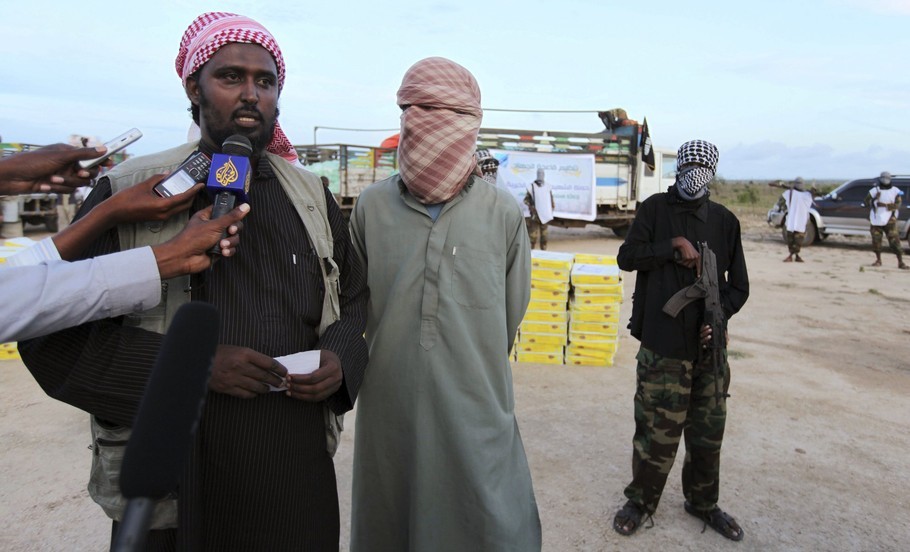
Shaykh ‘Alī Moḥamūd Raage:
“Praise be to Allah, and peace and blessings be upon on our prophet Mohammed and all his family and companions.
We thank Allah (Glorified and Exalted be He), who made Muslims one brotherhood (as) Allah says “verily believers are but one brotherhood”, for that reason, Whilst our brothers are at arms all over the world, especially those of the umbrella organisation which connects all mujahideen;-Al-Qaeda, whilst at arms, they have sent to their brothers in who reside Somalia, standing with them at this time of drought, and they previously spoke of aiding muslims (in Somalia), especially the Ameer (leader) of the Al-Qaeda Jihad Organisation Ayman Al-dhawahiri may Allah preserve him, and sufficiently before him our brother may Allah accept his martyrdom sheikh Usama Bin Laden , and today they make good upon that which they preached since it is also the conclusion of their drought campaign.
We welcome them (to their) afflicted brethren in this camp, we also after thanking Allah we thank our international brothers, especially our honourable leaders for the aid relief they sent to their Muslim brethren.
In front of you today, brought to fellow needy Muslims, is that which your Mujahideen brothers handed over to Harakat –al-shabaab Al-mujahideen who will be responsible for its distribution, and it includes , 2000 Hijabs for the purpose of sufficiently covering up to use for the performance of prayers, also 10,000 pieces of clothing for children, also enough flour,rice and coocking oil for 4,000 families, also 4,000KG of dates , 4,000 of tins of milk 900g each, and since we are of the Islamic faith 1,500 copies of the Holy Quran is included, also 1,500 copies of “hisnul Muslim” (prophetic supplication books) , $12,000 changed to Somali shilling is also to be distributed since the (dayr) rainy season is upon us so to use in farms, you can also see (donated) an ambulance to admit ill people rapidly to the field hospital, also a lot medicine is included, so we thank Allah then we than our mujahideen brothers, especially the top mujahideen command in the Al-Qaeda Jihad Organisation, who seriously took its responsibility to aid their brethren, this (action) shows that they have made true what Allah said “harsh against the disbelievers and merciful among themselves… (Quran 48:29)” … so we say to you may Allah reward and bless your efforts, so i call upon Abu abdallah al-muhajir to read us his statement for the ceremony.
Abū ‘Abdallah al-Muhājir:
Here is his audio: Abū ‘Abdallah al-Muhājir — Statement from al-Qā’idah in Somalia
“Asalamo ‘alaykom wa rahmatollahi wa barkaatoh [Peace be upon you (all) and the mercy and blessings of Allah]”
We praise Allah, seek His help, and ask for His forgiveness. We seek refuge in God from the evils of our souls and our bad deeds.
Whomever Allah guides none can misguide and whom Allah misguides none can guide. I bear witness that there is no deity (worthy of worship) but Allah alone, and I bear witness the Mohammed (pbuh) is his slave and messenger”
Allah says, after i seek refuge from Satan the outcast “and surely we shall test you with something of fear and hunger, some loss in goods or lives or the fruits (of your toil), but give glad tidings to those who are patient , “Those when afflicted with calamity say: “Truly To Allah We belong, and truly to Him is our return”:- “They are those on whom (Descend) blessings from Allah, and Mercy, and they are the ones that receive guidance.” Quran 2:155- 2:156- 2:157
“Al-hamdulilah (Praise be to Allah) we honoured and blessed to take this opportunity to send our heartfelt greetings to our brothers and sisters in Somalia and we also take this opportunity to tell you we love you all for the sake of Allah , and we sincerely relate to your suffering and affliction during these testing times.
Dear Muslims of Somalia, it is under these strenuous circumstances that we remember the role played by our beloved Sheikh Usama Bin Laden may Allah have mercy upon him. Sheikh Osama was deeply concerned about the plight of the Muslim Ummah (nation) all over the world, including the situation in Palestine, ’iraq , Kashmir and Afghanistan to name a few places.
Having actively participated in assisting various parts of the Ummah (nation) with everything for the past 30 years, the Sheikh (Osama) also focused his attention specifically on the hardships and tests that have afflicted the Muslim Somali people for the past decade. He as leader of Al-Qaeda organisation played a major role in repelling invading force of the muslim land in Somalia, from the American invasion during the early nineties to the recent invasion of Ethiopia as well as the current invasion of AMISOM.
In addition to sacrificing his wealth and his life in the path of Allah though waging Jihad, the Sheikh greatly emphasised the importance of Muslims supporting each other, and he brought attention to the dilemmas affecting Muslims around the world. The most recent example of which is, the major flood that affected the millions Muslims in Pakistan, and today with graceful departure of our beloved sheikh and that beacon of Tawheed (monotheism) May Allah have mercy upon him, Al-Qaeda under the leadership of Sheikh Ayman Al-dhawahiri may Allah protect him, continuously highlights the plight of the Ummah and continuously supports them with every means at their disposal.
In a recent release Sheikh Ayman brought the drought in Somalia to the attention of the Muslim Ummah and encouraged to support their brothers in Somalia, and insha’allah (Allah willing) with this message some of what your brothers in Al-Qaeda have been able to gather will be distributed to our brothers and sisters, to our families in the land of the two migrations.
We would also like to take the opportunity to encourage Muslims all around the world, to come to the assistant of their brothers and sisters in Somalia, and it is obligatory on every Muslim to assist their needy brother and sisters, the prophet (Pbuh) said: “the believers in their mutual mercy, love and compassion are like a single body, if one part of it feels pain, the rest of the body join it, in staying awake and feeling the fever.
In addition to that, we would like to praise the continuing effort of harakat- Al-shabaab – al mujahideen, who while operating under extremely difficult circumstances, have made it their priority in helping their brothers and sisters …[inaudible] , and have risen above the lies and deceit distributed by the hypocritical western media.
Finally, we ask Allah to accept it from them and allow them to continue in their honourable efforts, and give them complete victory over the disbelieving forces.
Finally to our beloved brothers and sisters in Somalia, we are following you situation on a daily basis, and though a separated by thousands of kilometres, you are consistently in our thoughts and prayers, and regardless of the differences of language, color, lineage and culture, it is the pure creed of tawheed (monotheism) and that unbreakable bond of faith that unites us all.
We encourage you all to turn in repentance to Allah, increase your effort and put your trust in Allah, and by the permission of Allah you will emerge triumphant from these temporary hardships, despite the wishes of the disbelieving west to keep you in perpetual cycle of dependence.
Allah says in Surat (verse) Nuh “”I said (to them): Ask forgiveness from your lord, verily he is oft forgiving, he will send you rain in abundance and he will increase in wealth and children, and will bestow
As-Saḥāb Media presents a new video message from al-Qā’idah: "For Incitement and Publishing: You Are Held Responsible Only for Yourself, Parts 1 and 2"
UPDATE 1/5/14 7:12 PM: Here is an English translation of the below Arabic video message and transcription (with updates from events since the original video was released in June 2011):

Part 1:
Part 2:
__________
—
UPDATE 6/4/11 9:12 AM: Here is an Arabic transcription of the below video message:

Click the following link for a safe PDF copy: al-Qā’idah — “For Incitement and Publishing- You Are Held Responsible Only for Yourself, Parts 1 & 2”
_____
—
Part 1:
[wpvideo 8oA7N51h]
Part 2:
[wpvideo mwase3K1]
______
GUEST POST: Why Jihadi Ideology Matters
NOTE: As with all guest posts, the opinions expressed below are those of the guest author and they do not necessarily represent the views of this blogs administrator.
Jihadology.net aims to not only provide primary sources for researchers and occasional analysis of them, but also to allow other young and upcoming students as well as established academics or policy wonks to contribute original analysis on issues related to Global Jihadism. If you would like to contribute a piece, please email your idea/post to azelin [at] jihadology [dot] net. Pieces should be no longer than 2,000 words please.
–
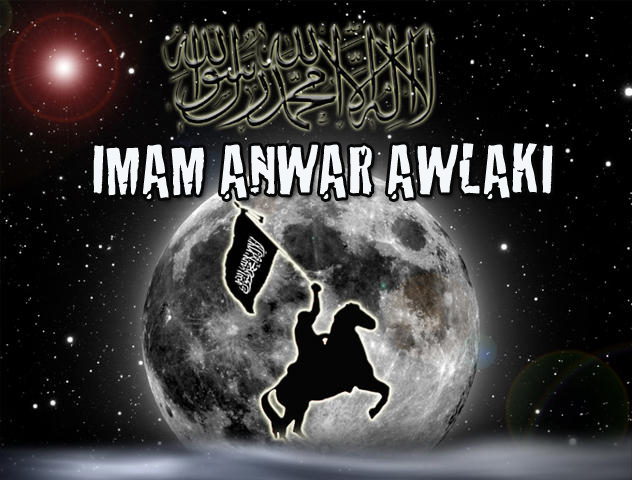
By Daveed Gartenstein-Ross
On January 19, Joshua Foust posted a rather interesting article at Jihadology questioning Anwar al-Aulaqi’s importance as a jihadi ideologue, and in so doing, also called into question the assumed linkage between Islamist ideology and behavior. Though Foust’s post raises interesting and valid questions, and introduces bodies of research that are often ignored in debates over terrorist radicalization, I find his conclusion problematic for three reasons. First, Foust seems to be arguing against a strawman on the question of how ideology can have an impact on behavior. Second, the applicability of his general observations about the connection between ideas and behavior is questionable in the context of Islamist ideology. And third, erecting the very high evidentiary standard with which Foust concludes his article is not at all helpful when it comes to a problem set like terrorist radicalization, which it is necessary to address now.
Strawman Opponent?
It is somewhat unclear what Foust is objecting to within the current literature on radicalization—which, in fairness, is reflected in his post’s title, “Some Inchoate Thoughts on Ideology.” But to the extent his article refutes a definable set of ideas, it seems to argue against monocausal explanations of behavior. Specifically, Foust writes:
The assumption behind the ideology discussion appears to be that behavior is a gun, and ideology is a trigger. That is, you have a person, they accept ideology, and then the output is behavior (in this case, violence). But that just isn’t how people work, and using some basic logic and self-knowledge can reveal that. We are not mono-causal creatures, even in relatively simple matters like choosing where to eat lunch.
The last point is undoubtedly correct: we are not monocausal creatures. But which authors, specifically, share this set of assumptions? A careful reading of Alexander Meleagrou-Hitchens’s Foreign Policy article that is the hook for Foust’s piece reveals no such monocausal assumption, though Meleagrou-Hitchens clearly does conclude—contrary to Foust—that ideology is important. Nor does Foust point to other authors who write about ideology as though it is the sole cause of terrorist violence.
This framing of the discussion seems designed to bolster the importance of Foust’s refutation. But the contribution an author can make by refuting a clearly exaggerated interpretation of a subject is minimal when that exaggerated interpretation does not represent the conventional wisdom in a field. And in the academic discussion of terrorist ideology, it seems that the dominant opinion among prominent scholars—including Marc Sageman, Jessica Stern, Robert Pape, Jerrold Post, and now apparently Brian Michael Jenkins—is that religious ideology is relatively unimportant. (There are of course plenty of scholars on the other side of this debate, including Mary Habeck, Assaf Moghadam, and myself.)
So let’s define the debate in a more reasonable way. The question is not whether terrorists are automatons who read something on the Internet and then act in service of that idea. They aren’t, full stop. Rather, the question is whether religious/ideological factors seem to provide a robust explanation for both terrorist radicalization and also terrorist actions.
One Man’s Experiences
Before turning to the role of al-Aulaqi specifically, I’d like to address the role that Islamist ideology has on behavior. Foust writes: “The heart of my problem with discussing Islamist ideology is that I don’t understand how it affects behavior.” This is because behavior is complex, encompassing such causal factors as “constraints, signaling from peers, intent, and capability.” On the question of how Islamist ideology can impact behavior, I believe the answer is so obvious as to be virtually indisputable. Note that Foust frames the issue as Islamist and not jihadi ideology. I don’t know whether this framing was purposeful, but I’m glad that he put the question this way, because an examination of Islamist behavior is illuminating.
As I recently discussed on a Bloggingheads appearance with Matt Duss, and as a number of readers will know, before my entry into the counterterrorism field I worked for an Islamist charity, the Al Haramain Islamic Foundation, that has now been named a specially designed global terrorist entity by the U.S. Treasury Department. I had converted to Islam in college, and worked for Al Haramain in 1998-1999 between college and law school. I entered as a relative Islamic novice, with a very moderate conception of the faith; during my time at Al Haramain, my behavior changed substantially and I ultimately adopted an interpretation that I now consider extreme. Though I wrote a book about this period in my life, until now I have not really introduced my experiences into my own academic work on radicalization due to my awareness that people often universalize their own experiences improperly. However, their applicability should be clear in this response to Foust; and then I will introduce my empirical work on the subject.
At its heart, Islamism holds that human instincts and inclinations do not provide a reliable guide for determining morality. The reason Islamists believe that society should be governed by sharia is because man-made laws are contingent, and subject to shifting views of morality. Only God’s guidance, as best exemplified in the Qur’an and sunna, provides a reliable and unquestionable framework for determining how a society should be run. But if we can only trust God—and, related to that, Muhammad’s example—for the making of laws, isn’t it just as true that only the sunna can provide a guide to how we should live our own lives?
Thus, within Islamism, one’s behavior is clearly and unequivocally controlled by ideology. I encountered an intricately legalistic system within Al Haramain, wherein the restrictions were virtually all-encompassing. Growing a beard was required for men; likewise it was necessary to eat only with the right hand and roll one’s pants legs up above the ankles. Petting a dog, listening to music, and shaking hands with a member of the opposite sex all clearly transgressed the bounds of morality. Quite clearly ideology played a role in these behavioral outcomes. Absent the prevalent ideology (which could be described either as Islamism or Islamic conservatism), there is simply no explanation for why a relatively large number of people would decide to grow their beards out in a similar way, see dogs as unclean, stop making physical contact with members of the opposite sex, et cetera. While Foust writes that behavioral changes occur “in an unpredictable way,” in this case the behavioral changes all comported with the dominant ideology.
Moving beyond my own experiences, one of the remarkable aspects of Islamism—giving lie to Foust’s claim that behavioral changes in this area are unpredictable—is the consistency of behavioral changes across a broad array of cases. To be clear, not all Islamist interpretations of the faith are alike, and there are variegations among known Islamists, but in case after case the behavioral changes mirror those I experienced during my time at Al Haramain. One example is the Duka brothers—Shain, Eljvir, and Dritan—who were arrested with three others in May 2007 for plotting to attack the military base in Fort Dix, New Jersey. As the brothers turned to Islamism, they alienated family members with the announcement that “[t]he playing of music—a centuries-old tradition at Albanian weddings—had been banned” at Eljvir Duka’s wedding. Similarly, they spent an extended conversation captured via covert surveillance exploring the legalistic rules of how their beards should be kept:
Dritan Duka: That’s not really the way it [the beard] should be kept, it should be kept trimmed.
Unidentified male: It’s supposed to be neat, not, right trimmed but not over your lip.
Dritan Duka: Not shaved off completely.
Shain Duka then told a story about how a man in a Popeyes Chicken restaurant, after staring at them for a short time, asked why young men like them had such large beards. Shain recounted that “then we explained to him listen all the prophets wore beards and were Muslim so we wear the beards because all prophets wore beards.” Similarly, Daniel Joseph Maldonado’s behavioral changes included “wearing traditional Arab clothing, including the galabeyah, an ankle-length gown with long sleeves that covered the tattoos on his arms.” Tattoos are considered haram (prohibited by Islamic law) within the dominant conservative interpretations of Islam. Maldonado also tried to grow a beard; when he failed, “he blamed his Puerto Rican heritage and began chastising fellow Muslims who could grow a full beard and chose not to.”
Both Adam Gadahn and John Walker Lindh stopped listening to music. Gadahn had previously been seriously obsessed with death metal, but gave away virtually his entire music collection. Explaining this to the recipient, Gadahn said: “Well, I turned
Jihadism and the ‘Ulamā'
[Originally posted at al-Wasat. Unedited from the original.]
Two days ago, J.M. Berger of IntelWire wrote an article describing a recent trend in the statements and video releases published by Adam Gadahn and Anwar al ‘Awlaki that have tried to discredit the ‘ulama (religious scholars). These ideas, though, are not new, but provide further example of a trend, which has pervaded some of the key Jihadist intellectual thinkers in the post-Caliphate era (the Caliphate was abolished in 1924). Today, Hasan al-Banna, founder of the Muslim Brothers in 1928, would not be considered a global jihadist, but his ideas became a foundation for later thinkers to build off of and further radicalize his thought. al-Banna did not understand how the ‘ulama could do nothing in the face of what he percieved was happening to the Muslim world. He viewed the Muslim Brothers’ values as a refutation of the values of al-Azhar University (the most respected Sunni place of high education) and how the university dealt with contemporary issues. The late Richard P. Mitchell, a scholar at the University of Michigan and author of The Society of the Muslim Brothers, summed up al-Banna’s thought on the ‘ulama, stating:Azhar had persisted in a time-worn, anachronistic approach to Islam and its teachings—dry, dead, ritualistic, and irrelevant to the needs of living Muslims.[1]
Sayyid Qutb, who is viewed as the godfather of the modern jihadist movement, was critical of the ‘ulama as well. He believed they were opportunists that were using religious texts to their own advantage, which is pretty rich coming from Qutb, a man that has a degree in literature and created his own innovative way of understanding Islam.[2] Even more zealous over the problems with the ‘ulama was Muhammad ‘Abd al-Salam Farrag, who coined the term the near enemy as well as led the group Tanzim al-Jihad (later Egyptian Islamic Jihad) in the assassination of Egyptian President Anwar al-Sadat. These are his thoughts from his book Jihad: The Neglected Duty:
There are some who say that what we should do now is busy ourselves with seeking knowledge, for how can we struggle in the cause of Allah while we are lacking the knowledge, which is fard (obligatory) to seek? But we have not heard anyone who says that it is permitted to abandon an Islamic order or an obligation of the obligations of Islam because of knowledge, especially if this obligation is Jihad. So how can we abandon a fard ‘ayn (individual obligation) because of fard kifayah (collective obligation)? … So he who says that knowledge is Jihad must realize that what is fard is fighting … If a person wants to increase his knowledge … he could do so, because there are no restrictions on knowledge, which is available for everybody. But to delay Jihad because of seeking knowledge is an evidence of the one who has no evidence … However, we do not underestimate knowledge and scholars, rather we call for that. But we do not use it as evidence to abandon the obligations that Allah ordained.[3]
More recently, Osama bin Laden argued:
Despite of this hard siege imposed on you O my Islamic Ummah, you still have a great opportunity to regain your freedom to go out of the submission to and the dependence of this Crusader/Zionist alliance. To reach that, you should free yourself from the fetters of humiliation and subservience shackling us by the agents of this alliance who are our countries’ governors and their helpers especially the fetters of the Ulamaa of the Sultan, as well the fetters of the Islamic groups which transform their method to recognize the governor who betrayed the religion and the Ummah, and they join the political process of the state of this governor, and no difference for them if they are in the rule or opposition.[4]
Further, last month, Dr. Ayman al-Zawahiri stated:
This orientation has the purer methodology and the more correct doctrine, because it relies on the explicit and definite proofs of the Qur’an and Sunnah [Prophetic Way], and cites the historical and political reality of the Muslim Ummah, and believes neither in the fatwas of the “Fuqahaa” of the Marines nor in the hired ‘Ulama in Riyadh, Cairo and Qatar.[5]
Finally, Abu Muhammad al-Maqdisi, the Jordanian cleric who mentored Abu Mus’ab al-Zarqawi and is considered the most influential living global jihadist theorist, has written about what he describes as the murji’ah (non-righteous scholars) on several occasions. Here are a couple examples:
Added up, one can see that individuals involved with the jihadist movement have tried to discredit the ‘ulama for quite some time now. One of the goals is to weaken state institutions linked to corrupt governments, as well as weakening potential enemies. Another is due to the lack of true religious legitimacy by many in the movement. As such, they are compensating and trying to discredit individuals who are trained in the religion and understand that their understanding of Islam is not based on the classical tradition. — [1] Richard P. Mitchell, The Society of the Muslim Brothers (Oxford, UK: Oxford University Press, 1993), 212-213. [2] Roxanne Leslie Euben and Muhammad Qasim Zaman, Princeton Readings in Islamist Thought: Texts and Contexts from al-Banna to Bin Laden, (Princeton, NJ: Princeton University Press, 2009), 133. [3] Muhammad ‘Abd al-Salam Farrag, Jihad: The Neglected Duty (Birmingham, UK: Maktabah Al Ansaar Publications, 2000), 46-48. [4] Osama bin Laden, The Way To Rescue Palestine (As-Sahab Media Productions, 2008). [5] Dr. Ayman al-Zawahiri, A Victorious Ummah, A Broken Crusade: Nine Years After the Start of the Crusader Campaign (As-Sahab Media Productions, 2010). [6] Abu Muhammad al-Maqdisi, A message in support of the Mujahideen in Somalia and exposing the doubts created the Ullamah of Dajjaal(Minbar Tawhid W’al Jihad, 2009). [7] Abu Muhammad al-Maqdisi, The Caravan is Moving and the Dogs are Barking (Minbar Tawhid W’al Jihad).I advise them not be deceived by the ambiguities of the phony scholars, who confuse the truth with falsehood and confuse the path to Paradise with the path to Hellfire.[6]
The Mujahideen do not need you, half men and with no resolve. They do not need any advice on Jihad from scholars who are paid for and defeated. They do not need to ask you if it is okay with you or if their Jihad is compatible with you thinking. No, they do not need that. They have all the wisdom and the vision that they need. Die in your anger, and continue your criticism of the Mujahideen. You cannot destroy their resolve; your poisoned pins would not affect their Jihad. Nothing will affect them.[7]
Thoughts and Analysis on Gadahn's new video
“The young often realize the truth before the old and that laymen often recognize the truth ahead of the scholars.” – Adam Gadahn
For the second time in three weeks, Adam Gadahn has released a video message, this one titled “The Arabs And Muslims: between the Conferences of Desertion .. and the individual Duty of Jihād.” In it he uses the Mardin Conference, which was held this past March as a springboard to discuss the importance of jihād as being an individual duty (farḍ al-‘ayn) upon Muslims. I would like to highlight a few points:
From the Ashes of Iraq
Gadahn first directs his attention toward Arabs. Gadahn is trying to refocus Arabs and show them what is at stake: “Return once again to the call … and finish what you started.” Further, he argues that the possibility of mistakes and transgressions by the mujāhidīn is not an excuse to abandon the individual obligation of jihād: “A mistake isn’t treated by an even bigger mistake.” He affirms that these mistakes are not even close to the level of the transgression of the Crusaders and its proxies. This further reiterates the idea that following Abū Muṣ’ab al-Zarqāwī’s bloodlust in Iraq most Arabs were completely revulsed by AQ and they are still digging their way out of that mess.
‘Awlakī and “Lone-Wolfism”
Footage of Anwar al-‘Awlakī from a previous AQAP video release appears interspersed with Gadahn’s message. This could suggest that AQSL believes ‘Awlakī has become an asset to their cause. If this is the case, then one has to only look at ourselves, specifically the mainstream media and non-expert pundits who have hyped him up to the point where he could be seen by AQSL as an important tactical tool in their arsenal. It is a sad state of affairs that a guy who was mid-level AQAP at best has in only eleven months become so much more than his actual worth or standing in the wider AQ movement. One should look to J.M. Berger’s take on ‘Awlakī’s appearance in the video, which is a valid counterpoint to my above statement.
Gadahn also endorses the “lone-wolf” model that ‘Awlakī and his American pal Samīr Khān, the creator of Inspire Magazine, have called for recently, which was originally postulated by Abū Muṣ’ab al-Sūrī. Gadahn stated: “Don’t wait for some else, to do what you can do yourself.” To embolden potential recruits further, Gadahn continued: “Here you are in the battlefield.” Gadahn also provided examples of who “lone-wolf’s” should take as an example: Muḥammad Aṭā (9/11), Ṣidīque Khān (7/7), Muḥammad Būyīrī (Theo Van Gogh), Niḍāl Ḥassān (Fort Hood), ‘Umar Fārūq ‘Abd al-Muṭallib (Christmas Day), and Faiṣal Shahzād (Times Square).
Veiled Snipe at Recanters
Toward the end of Gadahn’s statement he directs a message to those who have recanted. He does not directly say anyone or a particular group, but one could infer he was speaking to Sayyid ‘Imām ash-Sharīf (Dr. Fadl), the Libyan Islamic Fighting Group (LIFG), or others. He argues that the movement still is in need of their expertise and efforts. He tries to remind them of the good old days by articulating that those involved now are the sons of the second and new generation, which are indebted to their previous efforts. Gadahn concludes: “Finish what you started, and aid your religion and ummah.”
Mardin and Ibn Taymīyyah
Fundamentally, the thing that should be taken away from this video is that the Mardin conference is a thorn in the side of AQ since it delegitimizes the foundation of much their theoretical work and raison d’être. This is the epitomy of the so-called “war of ideas.” Since AQSL is taking this message on they most likely feel threatened by its message and clarification of Taqī ad-Dīn Ibn Taymīyyah’s fatwā (legal opinion/decree) at Mardin (see first conclusions 1-7 here).
As is highlighted by the quote at the top of this analysis, Gadahn and AQ are in an uphill battle since they do not have classically trained religious and scholarly credentials. Gadahn also undermines his argument when he discusses the importance of Ibn Taymīyyah to the AQ movement. He states that those who are carrying out the obligation of jihād are not relying or following Ibn Taymīyyah in the first place in issues of jihād or other things. Instead, they have their own fiqh (jurisprudence), ‘ulamā’ (religious scholars), and books, which they abide by far away from the Ḥanbalī legal school (there are four Sunnī legal schools). For example, Gadahn says the commanders and scholars of the Ṭālibān in AfPak are from the Ḥanafī legal school and would therefore not take their ideas from Ibn Taymīyyah. That is a slight of hand, though. To those who have no background in the madhhab’s (legal schools) then one might take Gadahn’s statement at face value. As the well respected Islamic scholar Shaykh ‘Abd al-Hakīm Murād explained:
It was at that time [circa 11th century], too, that the attitude of toleration and good opinion between the Schools became universally accepted. This was formulated by Imām al-Ghazālī, himself the author of four textbooks of Shāfi‘ī fiqh, and also of Al-Mustasfa, widely acclaimed as the most advanced and careful of all works on uṣūl,uṣūl al-fiqh fīl madhhab. With his well-known concern for sincerity, and his dislike of ostentatious scholarly rivalry, he strongly condemned what he falled ‘fanatical attachment to a madhhab’. While it was necessary for the Muslim to follow a recognised madhhab in order to avert the lethal danger of misinterpreting the sources, he must never fall into the trap of considering his own school categorically superior to the others. With a few insignificant exceptions in the late Ottoman period, the great scholars of Sunnī Islam have followed the ethos outlined by Imām al-Ghazālī, and have been conspicuously respectful of each others madhhab. Anyone who has studied under traditional ‘ulamā’ will be well-aware of this fact.
As such, Gadahn is either way out of his league or he does not recognize this precedent since he articulated that AQ has in effect their own legal school above. From this, one can see that the Mardin Conference caused Gadahn to enumerate apologética for his and AQ’s understanding of Islām. The question is who is winning this battle of ideas, the classically trained ‘ulamā’ or the global jihadist ‘ulamā’? I will have more to say about this at a later date.
As-Saḥāb Media presents a new video message from Adam Gadahn: "The Arabs And Muslims: between the Conferences of Desertion .. and the individual Duty of Jihād"
UPDATE: Here are my thoughts on the Gadahn video.
NOTE: I will cover the video more tomorrow and provide some analysis, but for now see the video below.
—

New video release from Adam Gadahn: "The Tragedy of the Floods"
UPDATE 2: Here are transcripts in English and Arabic of Gadahn’s video statement.
UPDATE: Brian Fishman, J.M. Berger, and Christopher Anzalone make perceptive points as well:
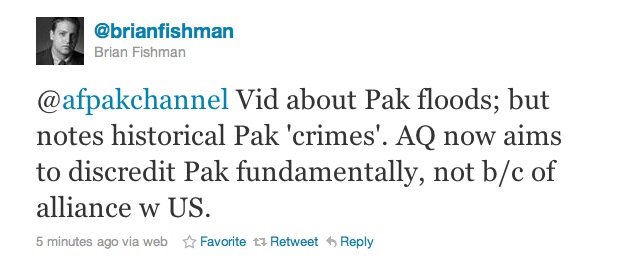
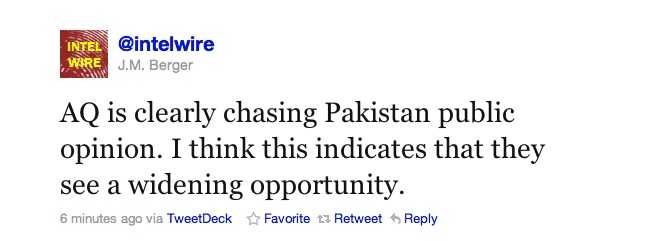
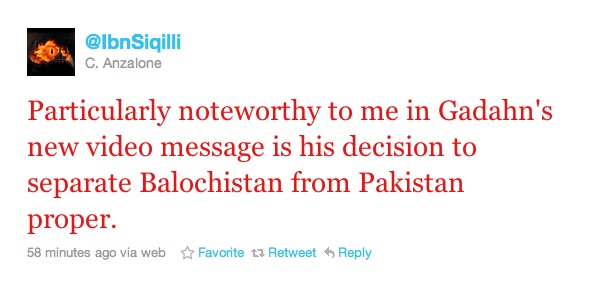
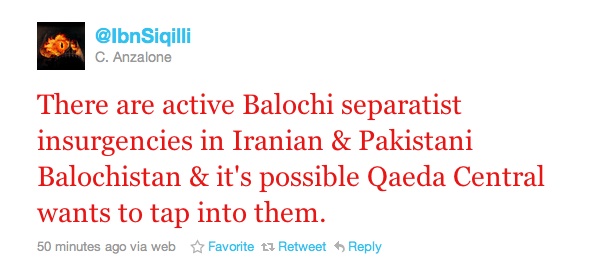
NOTE: Adam Yaḥyā Ghadan (“Azzām al-Amrīki”) was born as Adam Pearlman in California. He converted to Sunni Islam in 1995. He has been a senior operative for al-Qā’idah since 2004 and is currently in control of the As-Saḥāb (“The Clouds”) Foundation for Islamic Media Publication.
This video is boilerplate anti-American and anti-Pakistani talking points. The most interesting thing I noticed was that Gadahn was outside. Is this a message to the American’s that he is not afraid of the drone strikes or that he has more freedom of movement again? Also, I found it noteworthy that when Gadahn talked about the famous conspiracy he added an additional conspirator: “The Zionist-Crusader-Hindu Conspiracy,” which shows the importance the Kashmir cause has been taken-up within al-Qaeda as they have further embedded themselves within the Pakistani militant milieu.
—

Articles of the Week – 6/19-6/25
Sunday June 20:
“Legitimate Demands [2] Barack’s Dilemma” – Adam Gadahan, As-Saḥāb Foundation for Islamic Media Publication: https://bit.ly/c6dQXK
“Forget the substance of Gadahn’s post, it’s the tech that matters” – J.M. Berger, IntelWire: https://bit.ly/dty6tR
“Good Deal for Gaza” – Marc Lynch, The Middle East Channel: https://bit.ly/blRn8x
Monday June 21:
“Kandahar Timeline 1979-2010” – Alex Strick van Linschoten, A Different Place Blog: https://bit.ly/aM0bld
“The 2010 Failed State Index Rankings” – Foreign Policy Magazine, July/August 2010: https://bit.ly/9kutY3
“State of Jihad: 2010 and Beyond” – Matthew M. Reed, International Affairs Review: https://bit.ly/cYX4w4
“Politics and prayer”- Review of “A Mosque in Munich” – Issandr El Amrani, The National: https://bit.ly/95mbax
Jihadi Websites Monitoring Group, Periodical Review June 2010 – No. 1, International Institute for Counter-Terrorism: https://bit.ly/ab2WDN
“Profiles of the 15 known Saudi Guantanamo recidivists” – Thomas Joscelyn, The Long War Journal: https://bit.ly/bL1CEw
“A New Taleban Front?” – Thomas Ruttig, The Afghanistan Analysts Network: https://bit.ly/aexJjQ
Tuesday June 22:
“Yemen: Avoiding Freefall” – Ginny Hill, The World Today, Volume 66, Number 7, July 2010: https://bit.ly/aA7kln
“West Africa and the Maghreb Security Brief June 7, 2010 – June 22, 2010” – Critical Threats Project: https://bit.ly/cHdVL7
“Punjab’s growing militant problem” – Interview with Hassan Abbas, The AfPak Channel: https://bit.ly/c9Rvm4
“West coast jihad” – Brian Fishman, The AfPak Channel: https://bit.ly/dzmznm
Wednesday June 23:
“Militant’s Path From Pakistan to Times Square” – Andrea Elliott, New York Times: https://nyti.ms/b1ZJEX
“Veiled Truths- The Rise of Political Islam in the West” – Marc Lynch, Foreign Affairs: https://bit.ly/caa3UL
Thursday June 24:
“The Iraqi Elections of 2010—and 2005” – Kanan Makiya, The Crown Center for Middle East Studies, Middle East Brief 42, June 2010: https://bit.ly/9OfrOA
“Puncturing Pakistan’s “madrasa myth”” – Gregg Carlstrom, The Majlis: https://bit.ly/9vNjZR
Friday June 25:
“Saudi Preacher: The West Implements the Humane Values of the Shari’a Better than the Muslims” – Middle East Media Research Institute: https://bit.ly/9KHXNj
“The Legal War on Terror for the week of 6/18-6/24” – Andrew Lebovich, Foreign Policy: https://bit.ly/cI0a7I
“Al-Qaeda losing supporters in jihadi groups across Arab world” – Camille Tawil, Magharebia: https://bit.ly/bZw7yr
“Islamist Preacher Zakir Naik, Barred from U.K. and Canada – An Ideological Profile” – Steven Stalinsky, Middle East Media Research Institute: https://bit.ly/cXSiR4
‘Scratching the Surface of Radicalism in Germany” – Andrew Lebovich, The Washington Note: https://bit.ly/9ZsTHm
